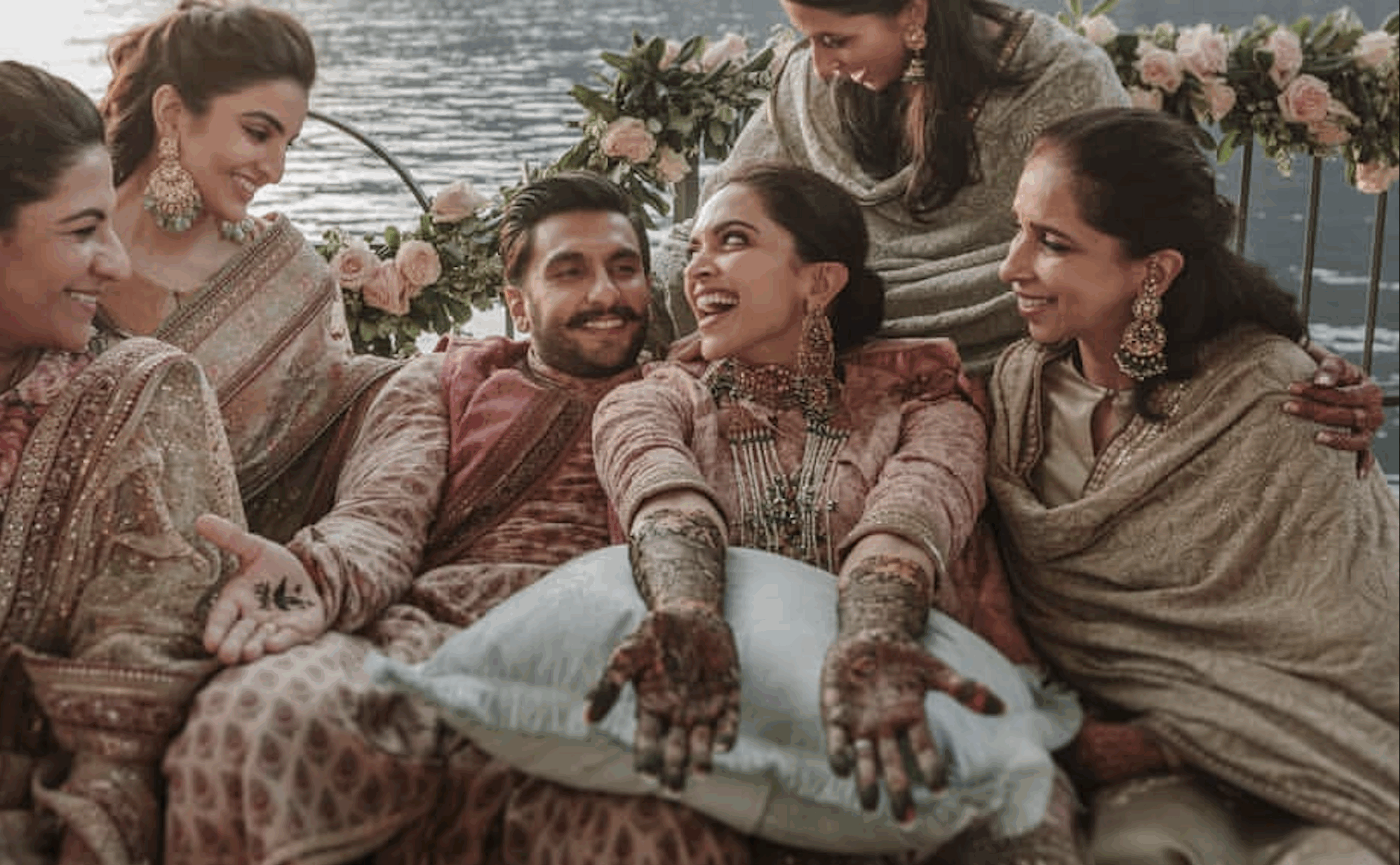There is something unmistakably electric about a desi wedding. The swirl of colour, the scent of marigolds, the dhol echoing down the street, the aunties in heavy silks discussing rishtas, and the endless procession of ceremonies that blur the lines between sacred and celebratory. It is not just a wedding but a spectacle, a ritual, and, above all, a gathering of generations. For as long as most of us can remember, weddings in South Asia, and among its diaspora, have been the embodiment of abundance, community, and collective joy. A reminder that love, in our cultures, is never about two people. It is about everyone.
But in recent years, something has shifted.
The weddings we attend, or don’t, have become quieter. Guest lists have gone from 800 to 80. Ballroom banquets have made way for home terraces. Dance rehearsals have shrunk. So has the number of outfit changes. And for the first time in perhaps centuries, we’re seeing an emergence of intimate unions and elopements being celebrated as the new norm. If the big fat Indian wedding was once the gold standard, today’s couples seem to be saying: less is more. This transformation, while quietly radical, brings up an urgent question: in shrinking the scale of the shaadi, are we also shrinking our traditions? Are we unintentionally editing out the rituals, the chaos, the collective memory-making that made our weddings what they were?
The intimacy movement
Micro weddings, court marriages, home ceremonies, destination elopements; these are not just stylish choices, they also reflect a deep, generational shift. A movement that favours authenticity over display, presence over production, and emotional intimacy over guest list diplomacy. This trend was no doubt accelerated by the pandemic, when health concerns and restrictions forced couples to scale down. But even as the world opened back up, many chose not to revert. What started as a necessity has become a conscious preference, and that preference speaks volumes.
It reflects how today’s young people, particularly urban, financially independent, and often living away from extended families, see marriage and celebration. To them, a wedding is less about showcasing social status or fulfilling familial obligation and more about honouring the love they have on their own terms. For many, the idea of spending enormous sums of money on functions filled with distant relatives, logistics stress, and rituals they don’t fully relate to simply doesn’t hold meaning anymore.
The risk of dilution
But here is where it gets complicated.
Desi weddings have always been rich with meaning, not just beauty. Every ritual, every ornament, every garland, and every chant is part of a broader cultural legacy. These weddings are not merely personal; they’re historical. They are where songs are passed down, recipes revived, dances learned, and communities bonded. A wedding is where your grandmother teaches you the significance of turmeric, where your uncle reenacts the dance from his own baraats, where cousins who haven’t met in years fall back into laughter like no time has passed. So when we pare down these experiences to a bare minimum, say a 15-minute court registration followed by a brunch at a cafe, we risk more than simplicity. We risk severing the thread that binds us to generations before.
Tradition isn’t just ceremony; it’s a connection. It’s the thumri played during your mum’s wedding sangeet. The way your family insists on wearing ivory on the engagement day. The way everyone gathers around the bride to sing songs during mehndi that don’t exist in any Spotify playlist. These aren’t “extras.” They’re the essence.
The celebrity effect
Even in the world of celebrity weddings, where extravagance is often expected, we’re seeing a shift toward the intimate. But it’s important to examine what this means, and what it might be encouraging.
Take, for example, Ranbir Kapoor and Alia Bhatt; Bollywood royalty by every stretch of imagination. When they announced their wedding, the country braced for grandeur. But what followed was a surprisingly quiet affair: a home wedding, just a few close friends and family, no destination venue, no public functions. In doing so, the couple challenged the dominant narrative that fame must be celebrated publicly. Sonakshi Sinha and Zaheer Iqbal took this even further. They tied the knot in a registered marriage, followed by a private celebration with only a handful of people. There was no public spectacle, no wedding hashtag flooding Instagram, no PR-pushed coverage. It was personal. Quiet. Unapologetically so.
These choices speak volumes, not just about celebrity culture, but about the evolving cultural mood. When public figures opt for intimacy, it validates the desires of everyday couples who no longer want weddings to be performative productions. It also raises a crucial question: if these high-profile couples are stepping back from tradition and scale, will others follow suit? And what will that do to the fabric of our shared rituals?
Beyond the glare
There is, undoubtedly, something deeply freeing about this shift. Smaller weddings allow for emotional clarity. The couple remembers each moment, each guest, each word spoken. There is less fatigue, less waste, and even more joy. With fewer guests and less pressure, the experience becomes about the couple, not the spectacle. And isn’t that what marriage should be? Moreover, the smaller format has sparked creative ways to honour rituals. A mandap built from heirloom saris, a family-cooked mean instead of a hotel buffet, a mehndi where women from three generations sit together and sing. These are not “lesser” weddings, they are deeply intentional ones.
But let’s not pretend that every intimate wedding is automatically more meaningful. In cutting away the noise, we must be careful not to cut away the soul. Cultural traditions, even when they feel outdated or tedious, often serve a larger purpose. They anchor us and tell us where we come from. And sometimes, they make space for others—elders, extended families, friends, to bless the union in ways that are felt, not staged.
The social vacuum & traditional evolved
There’s also a quieter loss to consider: the loss of community. For many families, weddings are not just about the couple, they are one of the few occasions in which extended family, neighbours, and friends across life stages come together. They are reunions, celebrations, spaces of forgiveness, memory-making, and joy. A tiny guest list might make sense for the couple, but what about the cousin you grew up with but no longer see? The grandmother who was waiting to dance at your sangeet? The friend who helped you through heartbreak and now, isn’t invited to the new beginning?
Of course, one cannot please everyone. But weddings have long been a collective celebration, and the retreat into intimate, nuclear affairs sometimes comes at the cost of collective memory and belonging. Still, to suggest that smaller weddings will destroy traditions would be overly alarmist. Culture is not a fixed script, it is a living, breathing organism. The key is not to preserve rituals for the sake of nostalgia, but to carry forward what matters and consciously reinvent what doesn’t.
There is no shame in rejecting rituals that feel patriarchal or meaningless. But what if, instead of eliminating traditions, we reinterpret them? What if the bidaai could be about partnership, not separation? What if the mehndi became a storytelling session? What if the wedding became a co-created experience between both families, and not a series of rehearsed performances. Tradition can evolve, but it must be rooted in intention, not convenience.
A thought to take home
As we continue to witness, and participate in, the rise of the intimate desi wedding, it is worth asking ourselves: What are we really choosing when we choose minimalism? Are we freeing ourselves from pressure, or are we quietly walking away from something precious? There is no one right way to celebrate a wedding, but as we rewrite the script, let us not erase its soul.
In the end, love will always be the centre of a marriage. But traditions? That is what surrounds it. And without that embrace; those songs, those elders, those silly chaotic rituals, we might find ourselves with a perfectly lovely ceremony, but no echo; no echo of where we come from. So the next time you attend, or plan a wedding, ask: What will we carry forward? And what are we willing to leave behind?
Because culture does not disappear in grand gestures. It fades in quiet choices and lives on only when we choose to hold it close; even as we whisper “I do”.













